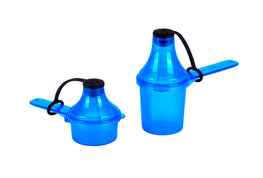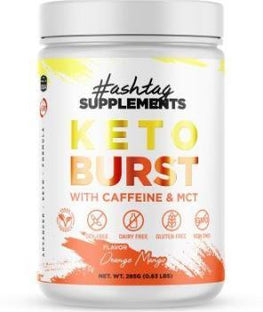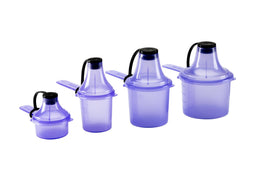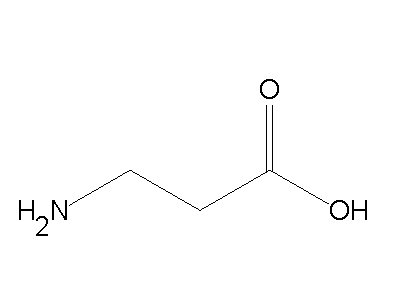What You Didn't Know About Beta-Alanine!! Supplement Ingredients Explained

Beta-alanine is a naturally-occurring beta-amino acid that shares a similar chemical structure with both GABA and L-glycine. It helps to stimulate the production of carnosine by mixing with the essential acid L-histamine, which in turn works to moderate levels of acidity (pH) in muscle tissues, allowing athletes to delay the onset and severity of muscle fatigue during high-intensity activities.
According to a study by the the International Society of Sports Nutrition (ISSN) "daily supplementation with 4 to 6 g of beta-alanine for at least 2 to 4 weeks has been shown to improve exercise performance", and that "beta-alanine attenuates neuromuscular fatigue....and may improve tactical performance".
What Is Beta-Alanine?
Beta-alanine, also known as 3-aminoproplonic acid, is known as a non-essential amino acid because it can be naturally produced within the body. Beta-alanine can also be derived from dietary sources such as beef, chicken, pork, and seafod, and through supplementation.
Beta-alanine works by bonding with histidine, another amino acid, to produce carnosine (also known as L-carnosine), a dipeptide molecule that's found in high concentrations throughout the tissues of the brain and muscles. Carnosine has been shown to act as a neurotransmitter, helping to improve cognitive functioning by reducing oxidization within the brain.
When consumed as a dietary supplement, beta-alanine is absorbed into skeletal muscle via the bloodstream, where it then binds with L-histidine to form carnosine.
As people age, naturally-occurring levels of beta-alanine and other non-essential amino acids within the body begin to decline, which some researchers believe is linked to age-related muscle degeneration, fatigue, and dementia.
A study on the effect of beta-alanine supplementation on muscle fatigue in participants aged 55-92 years old concluded that "BA supplementation....improves muscle endurance in the elderly" as a result of improved "intracellular pH control", which in turn may "have importance in the prevention of falls" among older adults.
Researchers are also reviewing reports that beta-alanine may have a positive impact of children with autism following unconfirmed reports that supplementation with beta-alanine improves neurotransmitter functioning among children diagnosed with Autism Spectrum Disorder.
Recommended Dosages and Side Effects
There are currently no standardized recommended dosages for beta-alanine supplementation available from the FDA, therefore, users should consult with their doctor and review manufacturers' recommended dose information before taking products containing beta-alanine.
Studies of beta-alanine supplementation use daily dosages ranging from 2400 mg (800 mg x 3 daily) up to 4.8 grams per day.
Supplementation with moderate dosages of beta-alanine is considered to be safe, and the only reported side effect is the development of acute paresthesia - an uncomfortable burning, itching, or hot flush sensation that manifests on the scaple, ears, and/or face. Parasthesia related to beta-alanine supplementation tends to disappate within about 60-90 minutes of onset, and the risk of suffering from "pins and needles" sensations can be reduced by cutting back on the dosage of beta-alanine.
Products That Contain Beta-Alanine
Beta-alanine is readily available from drug stores other retailers who specialize in natural supplements. It can be found in a variety of products, including:
Now Sports Beta-Alanine Powder - 2,000 mg (2g) beta-alanine per serving
Optimum Nutrition Threshold (Powder) - 1.6 g beta-alanine per serving; also contains L-Histidine, Silicon Dioxide, DiMagnesium Phosphate
Prolab Nutrition Beta-Alanine Extreme - 800 mg beta-alanine per 2-capsule serving; also contains 75 mg L-Histidine per serving
GNC Pro Performance Beta-Alanine - 3200 mg beta-alanine per 4-tablet serving; also contains cellulose, mica, caramel color










This is really interesting and contains a lot of information I didn’t know. As someone who routinely works out fasted, pre-workouts are fairly new to my training lifestyle. Last night I tried a pre-workout drink, which I chugged down about half an hour before a hard workout session at the gym. Within 10 minutes my hands, feet and face were itching and tingling as if I’d been slapped against concrete. It wasn’t painful and eventually subsided, but it was distracting nonetheless and I realized it was related to something I had consumed – which could only be the pre-workout drink I mixed up.
When I got back I started reading up on it and found this post, which answers a lot of questions. I’ll use it again, but I think I’ll start with a smaller dose and let my body adapt to it before increasing the dose. I found that seems to be true for most supplements I take.
Thank you for all the information. This is really helpful!